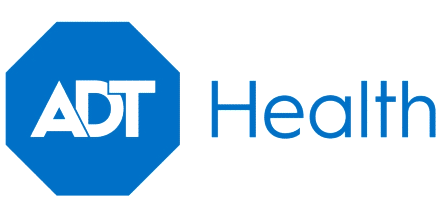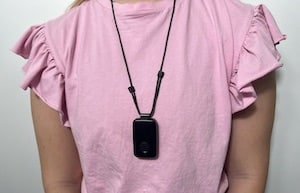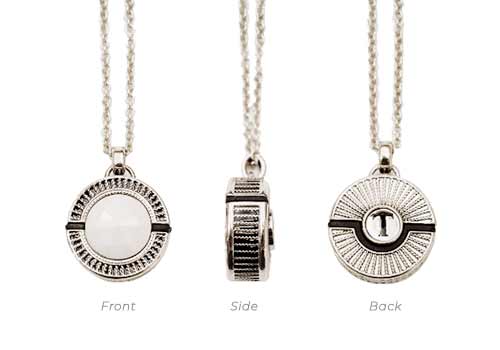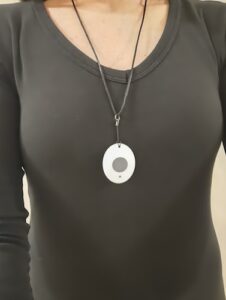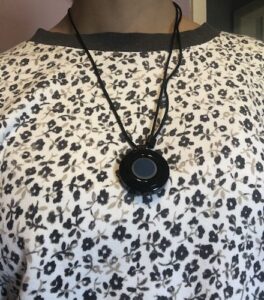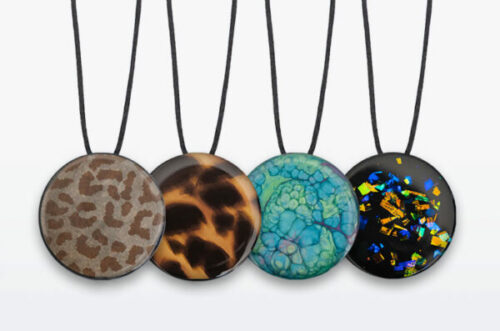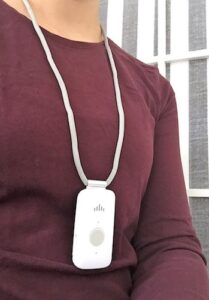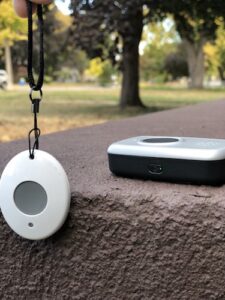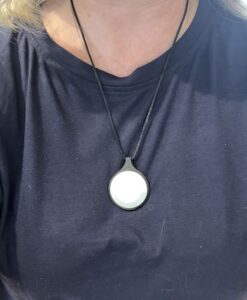- Starting monthly cost: $33.95 (in-home system)
- One-time equipment fee: $2.99 per month for extra in-home necklace, $149.95 for MGHome Cellular base unit, $149.95 for MGMini on-the-go necklace
- Processing fee: $0
- Free trial period: No
- Range:
- 1,300 feet (ft.) (MGClassic)
- 1,400 ft. (MGHome Cellular)
- Dimensions:
- MGMini: 2.1 x 1.3 W x 1.7 inches (length x width x height)
- Weight:
- MGMini: 1.3 ounces (oz)
- Connection types: Landline, AT&T cellular or Verizon cellular, GPS, Wi-Fi
6 Best Medical Alert Necklaces of 2025: Our Experts Tried & Tested
Medical alert systems can provide an extra measure of safety for older adults and anyone who lives alone or has a medical condition. While most medical alert companies provide both in-home units and on-the-go devices, not all of them offer medical alert necklaces. If you’re active or simply like to have your hands free while wearing your medical alert, a medical alert necklace could be just what you’re looking for.
Medical alert necklaces, also known as medical alert pendants, vary quite a bit in cost and features, so it’s important to first identify your needs and choose the best for you. We’ve researched and tested medical alert necklaces to help you make an informed decision. Read on for our top picks of the best medical alert necklaces on the market.
A quick look at the best medical alert necklaces
- Medical Guardian: Best Medical Alert Necklace for Older Adults
- MobileHelp Classic: Most Affordable Medical Alert Necklace
- Bay Alarm Medical: Most Stylish Medical Alert Necklace
- LifeFone VIPx®: Best Medical Alert Necklace with Advanced Features
- ADT Health On-The-Go: Best Medical Alert Necklace with GPS
- GetSafe: Best Medical Alert Necklace for At-Home System Package
Why you can trust our expert review
Table 1 Comparison of the best medical alert necklaces, as of February 2025
| Starting monthly cost | $33.95 | $19.95 | $24.95 | $43.95 | $39.99 | $29.95 |
| Equipment fee | $2.99/month (extra in-home necklace) $149.95 (MGMini) | $0 | $25 | $0 | $0 | $79–$307 |
| Processing fee | $0 | $0 | $0 | $0 | $0 | $0 |
| Battery Life | 2 years (in-home necklace) 5 days (MGMini) | 3 days | 2–5 years | 16 days | 40 hours | 5 years |
| Response time (seconds) | 1–25 | 25–50 | 45+ | 25–50 | 50+ | 1–25 |
| Fall detection available | Yes | Yes | Yes | Yes | Yes | Yes |
| Two-way communication | Yes (MGMini) | No | No | Yes | Yes | Yes |
| GPS | Yes (MGMini) | No | No | Yes | Yes | Yes |
| Water resistance | Yes | Yes | Yes | Yes | No (yes with help button or fall detection button) | Yes |
| Device range (in feet) for in-home systems | 1,300–1,400 | 1,400 | 1,000 | 1,300 | Unlimited | 1,000 |
Best Medical Alert Necklaces of 2025
Best Medical Alert Necklace for Older Adults: Medical Guardian
Most Affordable Medical Alert Necklace: MobileHelp Classic
Most Stylish Medical Alert Necklace: Bay Alarm Medical
Best Medical Alert Necklace with Advanced Features: LifeFone
Best Medical Alert Necklace with GPS: ADT Health
Best Medical Alert Necklace for At-Home System Package: GetSafe
What is a medical alert necklace?
Medical alert necklaces are one way to feel more prepared in the event of an emergency. If you have an accident or don’t feel well, you can alert a monitoring center by pushing the button on your medical alert necklace. Monitoring centers are open 24/7 and staffed with trained specialists. When you contact the monitoring center, the representative will ask you questions to help determine what kind of help you need.
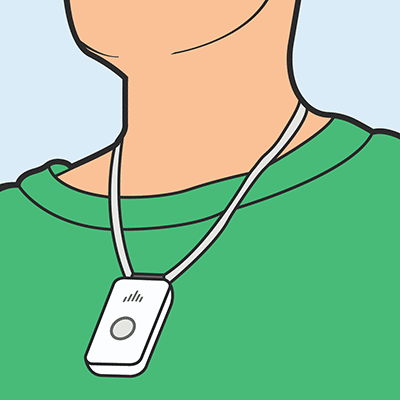
Medical alert necklaces versus medical ID jewelry
Medical alert necklaces are not the same thing as medical alert jewelry.
Lynda Shrager, MSW, OTR, a certified aging-in-place specialist, explained the difference between the two. “Medical alert necklaces are for falls and acute medical events. Jewelry tells someone there is a chronic medical problem and/or the wearer is taking certain types of medications, like insulin or blood thinners, that must be taken into account should a person need medical attention and not be able to speak for themselves,” said Shrager.
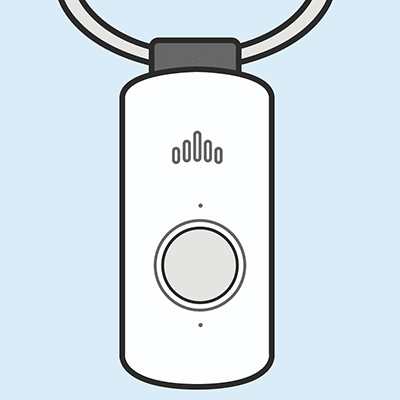
Pros/cons of medical alert necklaces
Medical alert necklaces are wearable help buttons that offer convenience and a range of features as part of an in-home system or a mobile system. Let’s look at the advantages and disadvantages of each.
How much do medical alert necklaces cost?
Medical alert necklaces range in cost, from the base cost of an in-home medical alert system, which starts at $20 per month for subscription fees, and up to about $200 in one-time equipment fees for the more advanced devices with GPS and two-way communication.
Common features of medical alert necklaces
- Emergency help button
- Water resistance
- Fall detection
- GPS
Whether to choose a medical alert necklace with or without GPS will depend on your daily activities, said Shrager. “If the person is active and leaving their home for various activities, then it is very helpful to have a [necklace with] GPS. Without GPS, the device will only cover the inside and perimeter of their home.”
How to choose the best medical alert pendant for you
It’s important to think about your needs and preferences when deciding which medical alert necklace is best for you.
For example, if you are at home most of the time and just need a help button to wear around your neck, a basic necklace, such as the MobileHelp Classic, would be a good option.
If you are active and want your necklace to have GPS tracking capabilities, take a look at ADT Health, LifeFone, or Medical Alert, all of which provide this feature.
Also think about whether you prefer a smaller necklace over a large one, and if you care about the way the necklace looks. Bay Alarm Medical is currently one of the only brands on the market offering decorative charm covers. These covers disguise the help button as jewelery so no one knows you’re wearing a medical alert help button.
Whether choosing a medical alert system for yourself or someone else, here are a few other things to consider:
- Does the user have hearing loss? Medical alert necklaces with speakers and two-way communication, such as those sold by LifeFone, Medical Guardian, and ADT Health, make it easy for someone with hearing loss to speak to monitoring center staff.
- Is arthritis or hand strength an issue? Look for a medical alert necklace with large buttons that are easy to push. The person who will be wearing the necklace will need to test the button to make sure they feel comfortable using it.
Who should use a medical alert necklace?
Anyone with a medical condition that puts them at risk of falling, losing consciousness, or becoming short of breath could benefit from using a medical alert system necklace in their home or carrying a mobile device with them.
According to our survey of medical alert users, 51% bought a medical alert system for themselves. Statistics from the Centers for Disease Control and Prevention show 78% of Americans age 55 and older are living with a chronic health condition, making it wise to own a monitoring system in case of an emergency.2
“If a person is aging alone, a medical alert can be activated to tell people they’re close with that they have fallen or may be having a medical event,” said Shrager. “When I am working with a patient as their home care therapist, I always recommend they have one.”
People who are caring for an aging parent or other loved one may also want to consider a medical alert necklace with GPS tracking and/or a caregiver app to help them stay connected with the medical alert user. LifeFone, ADT Health, and Medical Guardian all offer medical alert necklaces with these features.
While medical alert systems don’t take the place of loved ones and caregivers regularly checking in on an older adult, they can be an important part of a comprehensive care plan.
Tips for saving money on a medical alert necklace
Medical alert necklaces can be expensive, particularly if they have more features than a simple help button. You can save money on medical alert necklaces in the following ways:
Take advantage of payment plans
Most medical alert companies offer discounted monthly rates if you pay quarterly or yearly. If you can afford to do so, this is a great way to save money on a medical alert system.
Watch for sales
Medical alert companies often run sales around the holidays. You can find free shipping on devices, one free month of medical monitoring fees, or no equipment fees in some cases. If you’re interested in a certain brand but can wait to buy your medical alert necklace, keep an eye on the company’s website to see if it starts a sale you can take advantage of.
Use FSA or HSA funds
Because Medicare does not cover medical alert systems, the out-of-pocket costs can be a barrier to getting a medical alert system for many people. If you have a flexible savings account (FSA) or health savings account (HSA), you may be able to use those funds to pay for a medical alert system. Check with your plan provider for more details.
Look for veterans benefits
While none of the companies in this review offer discounts for veterans, some smaller medical alert companies in your state may provide medical alert systems at low or no cost to veterans. The Senior Veterans Service Alliance has a nationwide listing of these companies, as well as other information on veterans’ benefits.3
Consider all cost factors
Despite the company’s strong marketing, we do not recommend the Life Alert necklace. Our main concern with the brand is its cost and contract requirements. Life Alert requires a three-year contract for its monitoring services, with a penalty fee for early cancellation. Additionally, the brand isn’t clear about pricing, so potential customers need to sit through a sales call to fully understand their fees.
Lastly, the Life Alert necklace does not include fall detection, as the company does not offer that feature. Yet its fees are higher than the competitors on this list, with a monthly fee of $49.95 to $98.95 for monitoring services and a one-time $197 activation fee. When considering all these factors, Life Alert is much more costly than many other systems. You can learn more about it in our full Life Alert review.
Medical alert necklaces: Bottom line
Medical alert pendants can be a great way to stay protected in the event of an emergency when you’re at home and away.
For people looking to purchase a basic help button necklace to use at home most of the time, our team recommends Medical Guardian, MobileHelp, and Bay Alarm Medical.
For more active adults, GetSafe’s device is waterproof. LifeFone and ADT Health offer advanced medical alert necklaces with GPS and two-way communication for added safety anywhere you go.
Our team does not recommend Life Alert for medical alert necklaces or any other medical alert device.
Frequently asked questions
Some private insurance policies may cover part of the cost of a medical alert system that includes a necklace. Check with your insurance provider to see if your plan offers this coverage.
Based on their testing, we believe Medical Guardian is the best medical alert pendant for older adults.
But the best medical alert necklace for you is the one that fits your budget, personal needs, and preferences most closely. Think about why you want a medical alert necklace, how often you’re away from home, and whether you want a necklace with fall detection and/or an app that helps you stay connected to caregivers. These factors can all affect your decision of which medical alert necklace to buy.
Two of the most affordable brands we recommend are Bay Alarm Medical and MobileHelp, which both offer medical alert necklaces with monitoring fees starting at $19.95 per month.
Medical alert necklaces range in price from $19.95 to about $50 per month for monitoring fees. Some companies also charge one-time equipment fees, which can be up to $150 for medical alert necklaces with more advanced features, such as GPS tracking and two-way communication.
Medical alert necklaces with GPS location tracking, such as those sold by LifeFone, Medical Guardian, and ADT Health, can be used to locate the person wearing it.
To purchase a medical alert necklace, you can buy it directly from a medical alert system company. Our top recommendations are MobileHelp, Medical Guardian, Bay Alarm Medical, LifeFone, ADT Health, and GetSafe.
A medical alert necklace is better for fall detection, while a medical alert bracelet is better for a more discreet option. But fall detection technology continues to improve and more medical alert companies are adding this feature to their smartwatch devices. Ultimately, deciding if a medical alert necklace or bracelet is better for you is based on your preferences and lifestyle.
When searching for a medical alert necklace, look for if it’s water-resistant or has special features, such as fall detection or GPS. These emergency help button necklaces also come in many different sizes, with some as small as a bottle cap and some as large as a deck of cards.
A medical alert necklace is a wearable help button you can push in the event of a fall or emergency. The button communicates with a monitoring center that can connect with emergency services to get you the help you need.
Have questions about this review? Email us at reviewsteam@ncoa.org.
Sources
- Stevens Judy A., et al. Injury Epidemiology. March 20, 2014. Circumstances and Outcomes of Falls Among High Risk Community-Dwelling Older Adults. Found on the internet at https://www.ncbi.nlm.nih.gov/pmc/articles/PMC4700929/
- Centers for Disease Control and Prevention. Percent of U.S. Adults 55 and Over with Chronic Conditions. Nov. 6, 2015. Found on the internet at https://www.cdc.gov/nchs/health_policy/adult_chronic_conditions.htm
- Senior Veterans Service Alliance. Find Home Medical Alert Services in Your Area. Found on the internet at https://www.veteransaidbenefit.org/medical_alert.htm
- Medicare.gov. What’s not covered by Part A and Part B? Found on the internet at https://www.medicare.gov/what-medicare-covers/what-isnt-covered-by-part-a-part-b





